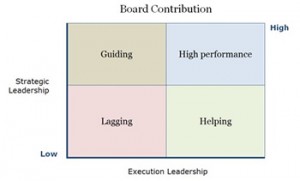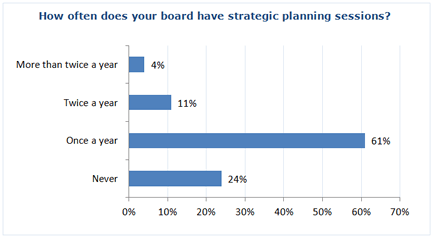Summary
- The board’s involvement seems to be reactive and greater in assessing the downside risk of strategy plans for the organization.
- The level of involvement of boards in discussions about growth and strategy planning is inadequate.
- The focus seems to be on shorter term oversight and less on long term and more substantive issues which could have significant long term implications with regard to opportunities for increasing shareholder value.
- It is unclear to a majority of board members how oversight of strategic planning oversight translates into tangible actions with regard to formulation and execution of growth strategies.
- Contact Arcus to benchmark your board performance.
The Board’s Roles in Oversight of Growth & Strategy

The Board’s overall responsibility with regard to oversight of strategic planning is often discussed in board reviews. However, it is unclear to most board members how this oversight translates into tangible actions with regard to formulation and execution of growth strategies. For the past decade, organizations have optimized operations and focussed on risk and compliance. Now, organizations are shifting their focus to oversight of growth and strategic planning.

Arcus asked 145 board members of mid-large organizations (with over 500 employees) about their views on the importance of the board in contributing to the organization’s growth and long-term shareholder value creation. The results indicate that 61 percent have strategic planning sessions once a year. And a surprising number of boards, almost a quarter of those surveyed do not have strategic planning sessions.
Our survey indicates that while directors spend just 18 percent of their time on long term strategic planning for the organization, 85 percent of directors would like to spend at least half their time on strategic planning. In addition, directors see a significant opportunity in changing the composition of their boards by adding new directors with diverse skill sets that would strengthen the boards collective capabilities in supporting the strategic planning process.
It appears that board members agree that:
- The board’s involvement seems to be reactive and greater in assessing the downside risk of strategy plans for the organization.
- The level of involvement of boards in discussions about growth and strategy planning is inadequate.

The focus seems to be on shorter term oversight and less on long term and more substantive issues which could have significant long term implications with regard to opportunities for increasing shareholder value. Directors agree that there are opportunities for them to increase their involvement in the oversight of growth strategy in context of short and long term planning cycles and risk management. It is important for boards to understand how they can apply their expertise more effectively on strategy issues.
Some of the areas that require greater clarity with regard to board member involvement include:
- The role of the director in oversight of corporate strategy and deployment
- The importance of the size of the organization in defining the level of involvement in strategic planning processes.
- Managing the areas where growth and risk intersect and the related impact on shareholder value.
- Development of a best practice mode for successful board involvement in strategy, productivity and innovation.
To manage these challenges, it appears that high performance boards generally are focussed on four important areas that drive growth: Human Capital, Change Management, Technology and Innovation. Human capital and specifically talent aligned with the strategic priorities of the organization has become a strategic imperative for CEOs as realize that a strong talent pool directly impacts shareholder value. Board in parallel are also beginning to recognize that they need to have stronger oversight of the human capital management process that results in the development and nurturing of emerging leaders within the organization. With an increase in the focus on mergers and acquisitions, boards recognize that a flexible change management strategy is essential for the organization to be quick to recognize and harness opportunities can have a significant impact on top line growth. How organizations manage change also can also impact how quickly they adapt their business strategy, operations and workforce to meet emerging opportunities.
Finally, technology and innovation are deeply related and can mean the difference between success and failure when driving key growth initiatives in fast growing markets. Emerging influencers such as social media and the changing dynamics of mobile communications are having far reaching impacts on reputation management and collaboration. The research study indicates that boards see significant value in a few key areas such as governance education programs and strategic planning sessions.
Contact Arcus for a facilitated presentation on best practices in governance with your board members.
Additional resources for Board Members
- The State of Governance in the non-profit sector
- Non-profit Sector- Fundraising Services
- Evaluating governance models
“Needless to say, there are many firms that provide research and strategy consulting services, but few can deliver the value demonstrated in performing the scope of analysis, strategies, product evaluations and practical recommendations. Your commitment and ease of doing business with your firm ensured that we had a sound basis to address our most challenging business decisions.”
– Mr. Peter Flattery, CEO, Healthcare Insurance Reciprocal of Canada
